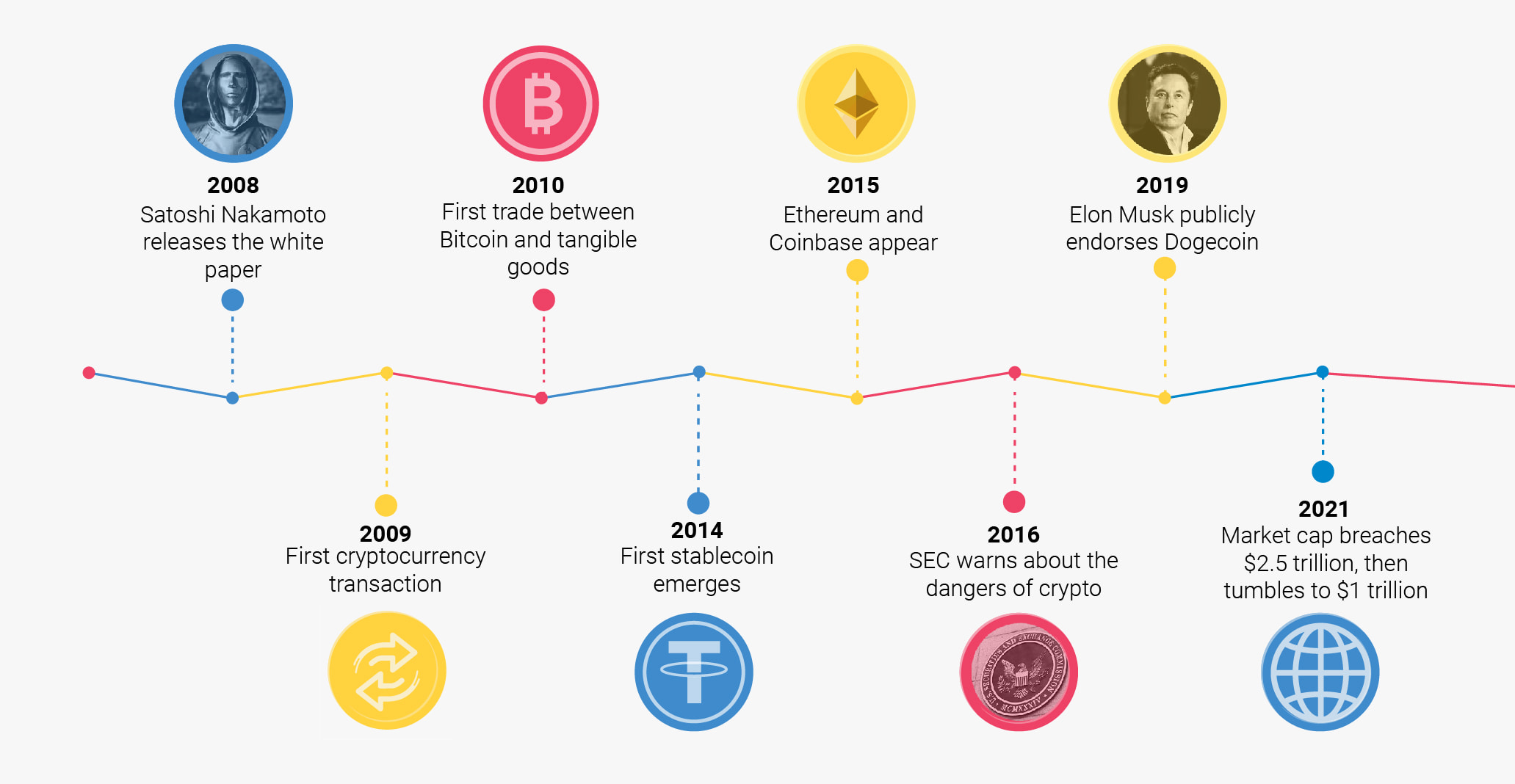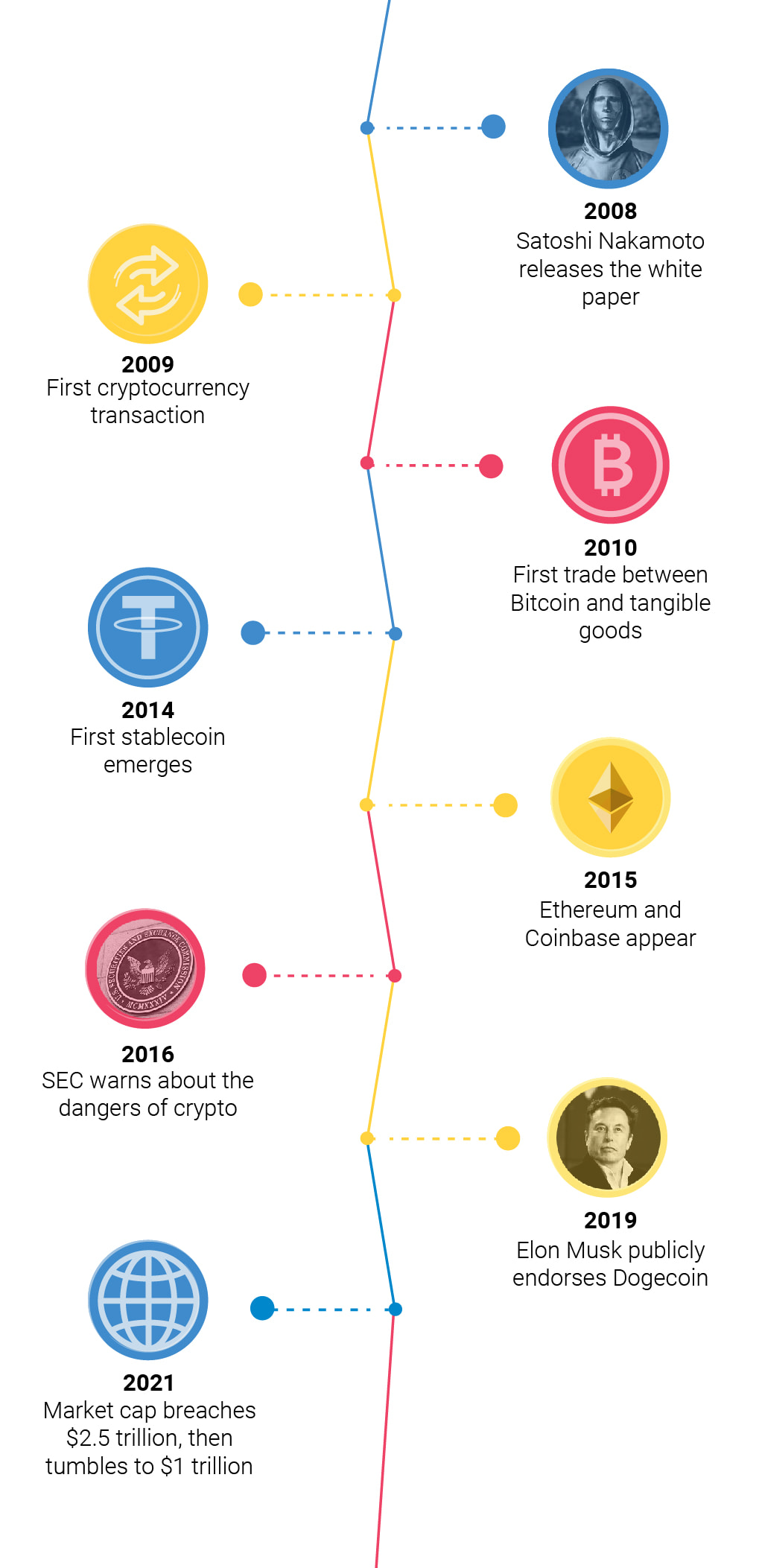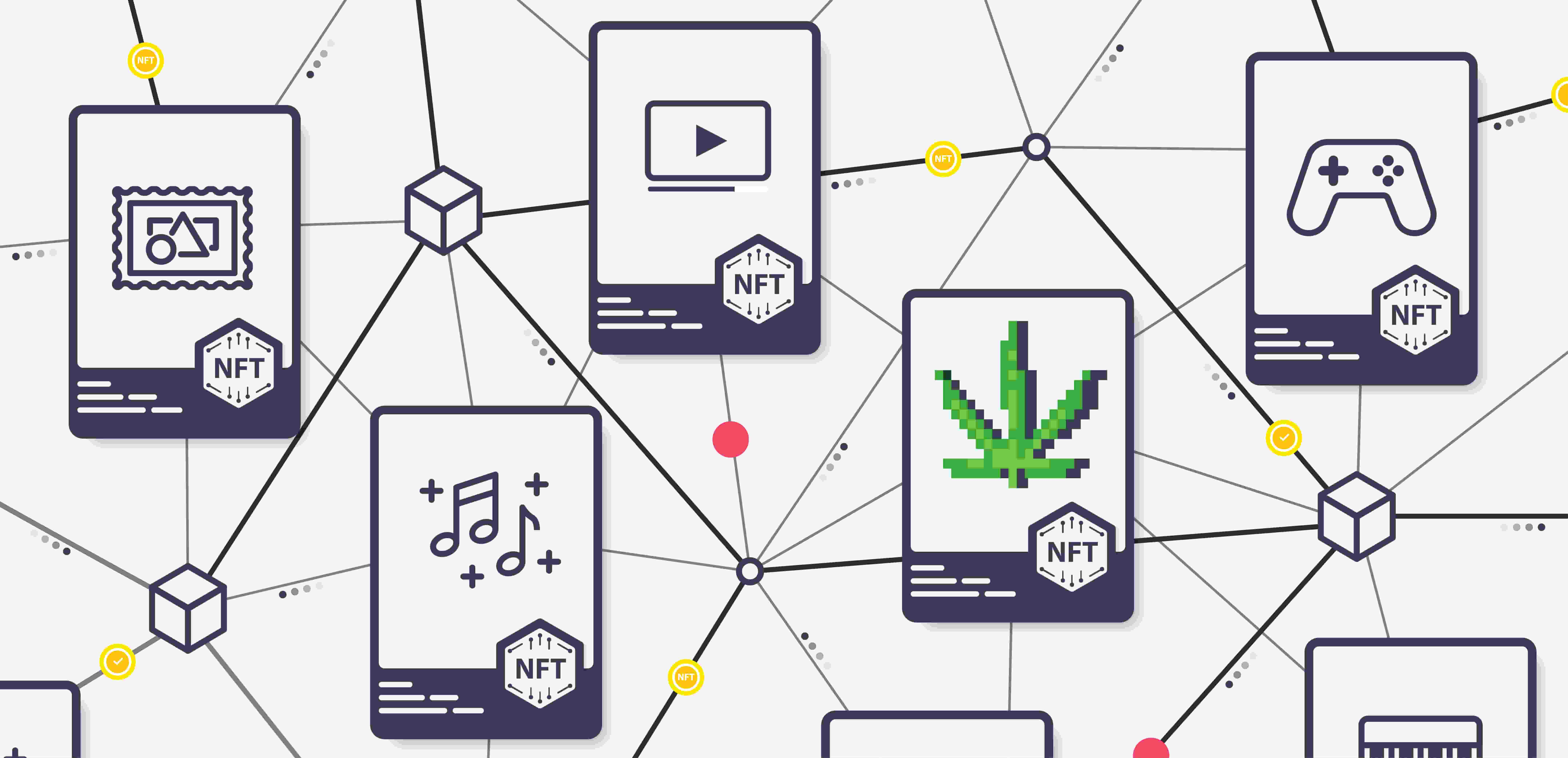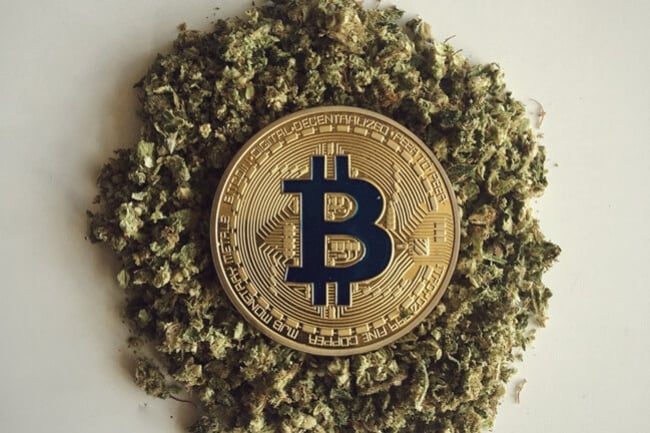.

Cannabis and NFTs: What Does the Future Hold?
NFTs exploded in demand following a record-breaking sale of $69 million for a piece of digital artwork. Now, they're popping up across industries, including sports, music, and even sneakers! Of course, the innovative cannabis industry has also grabbed hold of this opportunity. Find out how NFTs could impact the cannabis space.
What are NFTs? Why are they so valuable? What role do they play within the rapidly developing cannabis industry? Find out the answers to all of these questions below. While the NFT market continues to boom, most people still have no idea what they are or what they do. Get ahead of the game and learn everything you need to know about this new form of digital asset.
Contents:
Cryptocurrencies: A Brief History
To fully grasp the concept of NFTs, it’ll help to get familiar with cryptocurrencies, as the rise of cryptocurrencies set the technological foundations for NFTs to become a reality.
Cryptocurrencies are defined as digital currencies designed to work as a form of exchange between peers using a computer network that doesn’t rely on a central authority like a government or central bank. The decentralised nature of crypto has attracted people from a range of political philosophies, including anarchism and libertarianism. To ensure security and anonymity among users, crypto networks use blockchains—a record of transactions of a particular cryptocurrency maintained across multiple computers through a peer-to-peer network.
However, the utility of cryptocurrencies has attracted a much wider user base. Some of these digital coins are now accepted as a means of tender for insurance, consumer staples, watches, and event tickets. But where did this all begin? Check out the brief timeline of key events below:
- 2008: An anonymous individual under the pseudonym Satoshi Nakamoto releases a paper describing a decentralised form of digital currency.
- 2009: Satoshi Nakamoto makes history by sending 10 bitcoins to a programmer—the first cryptocurrency transaction. People also started mining bitcoin at this time using computers.
- 2010: The first trade between bitcoin and tangible goods takes place when somebody purchases a pizza using 10,000 coins (now worth approximately $196 million).
- 2014: The first stablecoin, “Tether”, emerges and pegs itself to the price of the US dollar.


- 2015: The cryptocurrency Ethereum emerges, as does the exchange Coinbase.
- 2016: The United States Securities and Exchange Commission (SEC) airs one of its first warnings about the dangers of crypto.
- 2019: Elon Musk starts to publicly voice his support for the “meme coin” Dogecoin.
- 2021: The total market cap of all crypto breaches $2.5 trillion before tumbling to $1 trillion.
Now that you’re more familiar with crypto and its history, let’s take a look at NFTs and how this new technology relates to cannabis.
What Is an NFT?
NFTs, or non-fungible tokens, are a form of digital asset. Much like cryptocurrencies, ownership of these assets is logged on a blockchain, a digital ledger of transactions recorded across a network of computers unified through a peer-to-peer network.
NFTs differ from cryptocurrencies in that they are non-fungible, or not mutually interchangeable. Whereas all coins of one cryptocurrency share the same value, NFTs all feature qualities that make them unique, and therefore, not interchangeable.
Advocates of NFTs claim that ownership documented on a blockchain circumvents the issue of reproduction and piracy, making them sit somewhere between physical asset and digital file. An NFT can be anything that can be stored as a file, such as music, artwork, tweets, and collectable assets that form the basis of online games.

Who Created the First NFT?
Even before the cryptocurrency Ethereum came about, the mathematician and now chairman of the Israeli Bitcoin Association Meni Rosenfeld developed the concept of “Coloured Coins” in 2012, an idea that sought to represent real-world assets using a digital ledger. Two years down the line, in 2014, digital artist Kevin McCoy minted the very first NFT. The proof of ownership of this digital image, known as “Quantum”, sat on the Namecoin blockchain.
While the initial creation of NFTs seemed insignificant to certain parties at the time, many of these digital assets have earned their creators massive financial gains. In 2021, the now-famous digital artist Beeple sold his collage titled “Everyday: The First 5000 Days” for a record-breaking $69 million.
OpenSea: Where NFTs Are Sold
Those interested in digital assets can buy NFTs from a wide range of marketplaces. However, OpenSea emerged as the first NFT trading platform, and remains the largest to this day. The website provides a place for users to discover, collect, and sell NFTs that autumn into a long list of categories, including art, collectables, domain names, music, photography, sports, and trading cards.
The Value of NFTs
NFTs are valuable for creators and collectors alike. Much like cryptocurrencies, they offer advantages that tangible assets do not. The ability to record proof of ownership on blockchains that are nearly impossible to hack or alter provides a big safety net. Adding to this, the decentralised nature of exchange allows for unparalleled flexibility when it comes to trading assets.
-
🎨 For Artists
What does selling a musical album, a piece of digital art, and even a house have in common? Third parties looking to rake in a little cash. In the non-digital world, record labels, art dealers, and real estate agents make mountains of money by facilitating the buying and selling of goods. The decentralised nature of digital asset trading allows artists and sellers to sidestep third parties and the endless fees—or commission—they tend to demand for their services. NFTs also enable artists to mint a certain amount of their product, leading to low supply, high demand, and an economy of scarcity that results in increased profits.
-
🖼️ For Collectors
Naysayers rail against the intangible nature of NFTs, often stating that digital assets don’t compare to those that one can physically grasp and, say, hang above a mantle piece. Well, tell that to Beeple. The market speaks for itself.
The rise of cryptocurrency has clearly shown that people value digital assets, in part because of the technology that makes these tokens secure, finite (in most cases), and easy to send and receive. The same applies to NFTs, but these assets offer something more for the collector. Blockchain-based ownership and limited supplies make owning an NFT of an album, photograph, or playing card many times more valuable than physical copies and those based on the blockchain.
-
👔 For Business
NFTs have shifted the market for digital assets. New marketplaces are emerging on ground broken by the establishment of NFTs, and businesses are scrambling to get involved in this still relatively early period. For example, NFTs not only show proof of ownership, but also proof of attendance, meaning they have the potential for use in live events such as festivals. Moreover, the smart contracts written into NFTs can ensure that the creators receive a slice of the pie if and when they are transferred to third parties.
NFTs: How Are They Useful?
NFTs have a variety of functions. Moreover, cryptocurrency has already proven that digital assets aren’t only useful, but also incredibly valuable (although somewhat volatile). To understand how NFTs are useful or viable in the modern world, check out some of the most promising NFT markets below.
1. Graphic Art
Artwork remains one of the most valuable NFT markets. Sure, you can’t hang up an NFT like you can a physical painting, but they look equally cool projected onto a wall. Plus, you can’t steal, lose, or damage NFT art. Currently, valuable art NFTs range from basic but expensive drawings of cartoon apes and cyberpunks to fine art pieces and striking digital masterworks.
2. GIFs
GIFs (which stands for graphics interchange format) are bitmap images used as logos and display graphics. GIFs are also commonly used in online communication as a form of living meme. Turning GIFs into NFTs offers a promising means of revenue for graphic designers, and a secure means of exchange for businesses that want exclusive rights and ownership of these digital products.
3. Videos and Sports Highlights
Sport highlights NFTs are becoming a big, big market. Recently, the NBA created a Top Shot product—a blockchain-based trading card system based on new angles of NBA highlights and digital artwork. So far, a LeBron James highlight has sold for over $200,000. This marketplace is destined to explode as other sporting organisations enter the space.
4. Collectables
Collectables and NFTs go together like hands and gloves. Physical collector's items typically become valuable over time as many of the original items are lost, discarded, or broken, with the exception of those released with a low supply. NFT collectables, however, are (for the most part) inherently valuable immediately following release, given the tightly controlled supplies. Almost unbreakable proof of ownership also ensures those who buy NFTs can keep them secure and erase the threat of con artists crafting counterfeit copies.

5. Virtual Avatars and Video Game Skins
While some NFTs seek to usurp the value of physical items and assets, others easily slot into already digital marketplaces. In the case of virtual avatars and video game skins, NFTs have found a welcoming home among online and gaming communities. To give you an idea of just how far NFTs are likely to reach online, Reddit has recently launched an NFT avatar marketplace.
6. Designer Sneakers
You can’t hold NFT sneakers. You can’t even wear them. But this hasn’t stopped demand from increasing. Much like playing cards and other collectables, NFT sneakers are fetching huge prices on digital markets. The average price for a pair of NFT sneakers sits between $6,000–10,000. If you want some CryptoKicks (a product patented by Nike), prepare to fork over $20,000 for certain pairs.
7. Music
NFTs even have the potential to change the landscape of digital music, a territory that fell victim to pillaging from pirate hoards over the past few decades. NFTs give musical artists the chance to regain an element of control over their products and the ability to sidestep third parties in the distribution process. Some artists are releasing one-off editions of albums, and others are providing limited audio-visual packages.
8. Authentication
Not only do NFTs have the ability to prove the ownership of digital assets, but they can also be used as a more secure replacement for “real-world” paper-based certificates of authenticity. For example, by matching a wallet number with a certain product (say a ring, for example) with a corresponding serial number, sellers can prove authenticity to buyers using proof of purchase logged onto a blockchain ledger.
NFT Controversy
As you can imagine, the same level of controversy that has plagued cryptocurrency also spills over into the NFT space. Check out the main bones of contention below.
❌ Buyer Fees
When trading NFTs, users are often subject to fees, known as “gas”, a price that it takes to fulfil a transaction on the Ethereum network. However, these fees are deemed far too high by some users, to the degree that they could stifle future growth in the space.
❌ Plagiarism
NFT artists have to pay gas fees when minting NFTs. Despite paying these rising prices, artists have discovered knock-off NFTs on certain trading platforms, which has raised concerns over the security of the work they upload and sell.
❌ Fraud & Security
Fraud and scams are rife within the NFT space. Many reports exist of buyers getting scammed out of their digital wallet credentials, resulting in significant financial loss. The digital asset space as a whole remains in somewhat of a wild west phase. According to a security company named Privacy HQ, 90% of survey respondents claim they have experienced a scam of some type.

How Are NFTs and Cannabis Related?
As one of the fastest-growing and most innovative industries out there, it only makes sense that the cannabis sector has started to embrace NFTs. Let's take a look at the most promising projects.
Crypto Cannabis Club
As the self-proclaimed hub for cannabis connoisseurs and digital art enthusiasts, Crypto Cannabis Club has sought to create an online community with its roots in the metaverse. The platform has sold cannabis-themed NFT art, metaverse property, and also offers play-to-earn games.
This organisation serves as a perfect example of how NFTs have the potential to take off in the cannabis space. Not only do they offer digital goods for sale, but they're helping to bolster the community around the herb and this new digital technology. They have a Discord server aimed at welcoming novices into the ecosystem, and they help keen NFT collectors set up MetaMask crypto wallets.
Blazed Cats
You've probably seen a lot of ape NFTs at this point, but have you seen any stoned felines? Blazed Cats has taken a fresh approach to NFT artwork by releasing a 10,000-strong collection of hand-drawn and randomly generated cats that all feature their own unique traits and accessories. You'll find everything from felines holding joints between their toes, to those riding cartoon aeroplanes, and those that sport a traditional hippy appearance—circular-frame sunglasses and bandanas included! Only one question remains: will you add these abstract pieces to your NFT collection?
Digi Strains
Forget Pokémon cards. Imagine owning legal digitised weed strains instead! Digi Strains, created by The Peakz Company, exists as the first digital cannabis strain collection to ever hit the blockchain. Far from shabbily drawn cartoon images, Digi Strains are three-dimensional creations made to inhabit the metaverse. Once purchased, owners can put their favourite varieties on show in their digital homes. These pieces of art are currently selling for around 0.03 Ethereum, equalling approximately $50.
The Future of NFTs in Cannabis
So far, NFTs in the cannabis space largely centre around artwork and games. However, they could play a much larger role in the future. Could NFTs help breeders secure and sell the rights to their genetic material? Could seed banks release NFTs alongside limited amounts of seeds to create super rare, expensive, and exotic strains? Only time will tell. So far, NFTs and cannabis seem like a compatible pair with a bright future.





































